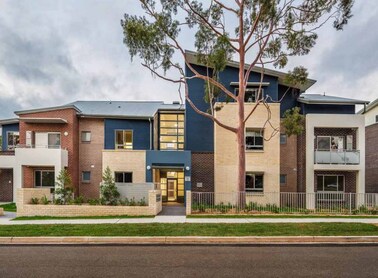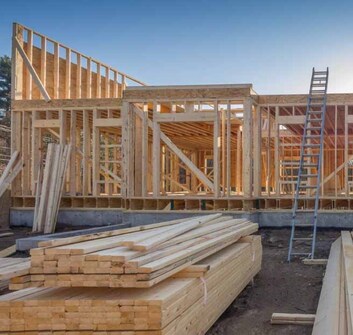 The State Government Big Housing Build allocated $25 million to build affordable housing in Bass Coast but no projects have been confirmed.
The State Government Big Housing Build allocated $25 million to build affordable housing in Bass Coast but no projects have been confirmed. By Helen Searle
A FAMILY in the Wonthaggi area was recently told they couldn’t renew their rental lease. They don’t yet have enough money to buy a home and they have not been able to find another rental property. Both parents are working and the children are settled in school. Soon they will be forced out of their community with the possibility of also having to give up their jobs.
Another Wonthaggi tenant, a woman in her 50s on a disability pension, has recently been given notice after many years because the owners are selling. She cannot find a place to rent and sees no other option than to couch surf with family until something turns up.
A FAMILY in the Wonthaggi area was recently told they couldn’t renew their rental lease. They don’t yet have enough money to buy a home and they have not been able to find another rental property. Both parents are working and the children are settled in school. Soon they will be forced out of their community with the possibility of also having to give up their jobs.
Another Wonthaggi tenant, a woman in her 50s on a disability pension, has recently been given notice after many years because the owners are selling. She cannot find a place to rent and sees no other option than to couch surf with family until something turns up.
These are just two of many examples of people who are being pushed out of our community because of a lack of public and affordable housing in Bass Coast. Homelessness has a huge financial and social cost to individuals and society. Increasingly local people are becoming aware of or are affected themselves by the housing crisis. It is a desperate situation for many.
Some families have had to move to Melbourne to secure a rental property. People are sleeping rough in bushland around the Shire or living in their cars. Employers are reporting that they are unable to secure staff due to a lack of housing availability.
Some families have had to move to Melbourne to secure a rental property. People are sleeping rough in bushland around the Shire or living in their cars. Employers are reporting that they are unable to secure staff due to a lack of housing availability.
| Council housing plan hits a hurdle Last November Bass Coast Shire Council identified six unused road reserves that it offered to Community Housing and the Salvation Army to build social housing. The surplus land was to be offered under a 45-year lease and expected to accommodate up to 16 social houses to be offered to local people on the Victorian Housing Register. However just two of the sites have been taken up by Community Housing – one in Cowes and one in Wonthaggi. Projects have yet to be confirmed. The Salvation Army initially expressed interest but has since decided it is fully committed to projects in other shires and municipalities at this stage. | The challenge is to work together to provide solutions. The Bass Coast advocacy group Housing Matters is demanding a meaningful and compassionate response from all levels of government. It needs to address all the barriers including low wages and the Centrelink Job Seeker payment of only $315 per week. The recently released State of the Nation’s Housing report predicts a shortfall of 163,400 houses across Australia between 2025 and 2032. Housing affordability will worsen with an upward pressure on rents. A lack of housing also has a negative effect on employment and physical and mental health. Hence the urgency for a national housing strategy that sets out long-term planning to limit runaway rental and house prices and build more public housing. Commentators and analysts are suggesting a raft of ideas for a national strategy including a 50 per cent increase in Commonwealth rental assistance payments and an immediate Commonwealth Government capital funding boost to finance 20,000 new homes around Australia. In addition the establishment of a $20 billion Federal Social Housing Futures Fund would provide an extra 3000 new dwellings per year to help meet the growing demand. Limits on wealth generation from housing, rent ceilings and greater security for private renters could also be included in the strategy. While planning to end property related subsidies may be controversial, unless housing shifts towards a social rather than a financial asset, providing sufficient shelter for all citizens is going to be really hard. |
The recent backdown by the Victorian Government on a plan to tax property developers to pay for 2000 more public houses each year highlights the problems of housing reform being linked to the election cycle and vested interests rather than a progressive bi-partisan long term housing strategy.
Local councils are attempting to find ways to contribute, including providing land and unused buildings fit for repurposing. As housing and homeless support services are overwhelmed by demands for help, some councils are funding their own outreach programs to assist rough sleepers. Other are combining their financial and community resources to find solutions.
Genuine community consultation is vital when suitable parcels of land are considered. For example, where surrounding residents have developed those spaces for useful community activities. This indicates that the community should have greater involvement in suggesting and deciding upon potential land sites.
Housing Matters calls on the Bass Coast Shire Council to release its affordable housing strategy as soon as possible for community feedback. Then the council and community can work together to advocate and find local opportunities and solutions. Unfortunately there is no indication yet that any builders/developers are willing to tender for the Victorian Government Big Build funding to build in Bass Coast. This situation needs to be resolved as soon as possible.
Housing Matters urges our community to consider what needs to change to ensure everyone has safe and secure housing. The housing crisis is a many layered issue that requires the needs of all to be met. The need is most urgent for those who are homeless.
Helen Searle is a member of Housing Matters Bass Coast.
Local councils are attempting to find ways to contribute, including providing land and unused buildings fit for repurposing. As housing and homeless support services are overwhelmed by demands for help, some councils are funding their own outreach programs to assist rough sleepers. Other are combining their financial and community resources to find solutions.
Genuine community consultation is vital when suitable parcels of land are considered. For example, where surrounding residents have developed those spaces for useful community activities. This indicates that the community should have greater involvement in suggesting and deciding upon potential land sites.
Housing Matters calls on the Bass Coast Shire Council to release its affordable housing strategy as soon as possible for community feedback. Then the council and community can work together to advocate and find local opportunities and solutions. Unfortunately there is no indication yet that any builders/developers are willing to tender for the Victorian Government Big Build funding to build in Bass Coast. This situation needs to be resolved as soon as possible.
Housing Matters urges our community to consider what needs to change to ensure everyone has safe and secure housing. The housing crisis is a many layered issue that requires the needs of all to be met. The need is most urgent for those who are homeless.
Helen Searle is a member of Housing Matters Bass Coast.
